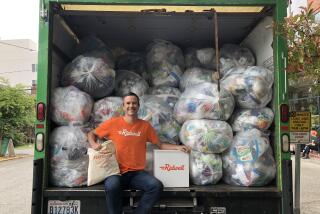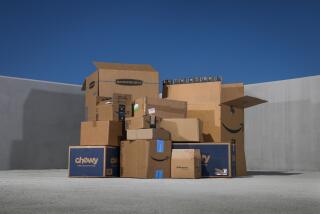Board of Trade Will Deal in Trash : Environment: Market will address recycling problems by adding plastic, glass garbage to its list of commodities.
- Share via
NEW YORK — The Chicago Board of Trade is out to prove that one person’s trash is another’s gold.
The world’s biggest commodity market--where wheat, corn, oats and other goods are traded daily--said Wednesday that it will add recyclable plastic and glass garbage by late this year.
The system is designed to address some profound problems in efforts to recycle garbage rather than bury or burn it. For example, many communities have abandoned plastic recycling because they can’t find enough buyers to make it cost-efficient.
Under the Chicago Board of Trade’s free-market approach, communities, states, waste haulers and other trash sellers will be able to enter information about their available recyclables into on-line computers. Included could be specifics such as trash color and transportation mode used to deliver the goods.
Once or twice a day, potential buyers would be able to use their computers to check out what’s for sale. These customers range from glass container manufacturers to polyester makers who use plastic soda bottles as raw material.
Initially, the trading will involve only commonly recycled trash such as soda bottles and milk and juice jugs, but it could be expanded.
“This is providing a one-stop shopping opportunity for buyers and sellers to communicate, to really get a sense of the breadth and depth of the product,” said Will Ferretti, director of the New York State office of recycling market development and a developer of the initiative.
The exchange of detailed information on trash could help address some common recycling woes. For example, presorted trash could attract buyers who can’t mix clear and colored glass, or different types of plastic, in making new products of recycled materials.
Another potential benefit under the system is the availability of arbitration to enforce contracts between buyer and seller. Ferretti said that buyers of recycled materials routinely reject trash they intended to purchase because it fails to meet their specifications.
In addition, Chicago Board of Trade inspectors will be available to inspect goods for sale.
The electronic trading system is a far cry from the raucous floor activity that routinely occurs in the trading pits of the Chicago Board of Trade for more widely traded commodities.
But the developers of the trash trading system hope to eventually consider trading futures contracts on recyclable materials. Like other such contracts, trash futures would represent commitments to buy or sell goods at a specific point in the future for a predetermined price. That could open the market to speculators in waste materials.
The waste exchange is the latest attempt by the Chicago Board of Trade to turn pollution into a commodity.
On Tuesday, the board ran its second annual auction of rights to pollute the environment as part of a sulfur dioxide-reduction program administered by the U.S. Environmental Protection Agency.
In such an auction, companies whose plants pollute less than federal standards allow can sell their remaining “rights to pollute” to those whose emissions exceed the standards.
More to Read
Inside the business of entertainment
The Wide Shot brings you news, analysis and insights on everything from streaming wars to production — and what it all means for the future.
You may occasionally receive promotional content from the Los Angeles Times.










